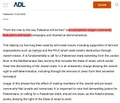From the river to the sea
From the River to the Sea is the start of an aspirational chant long associated with the struggle for Palestinian freedom, an end to the brutality of Israel's occupation of Palestinian territories, an appeal for Palestinians' right to self-determination, and a demand for equality in the eyes of the world and the law. Despite having been around and in constant use for over sixty years, there have always been criticisms lobbed against its use. The phrase gained extreme notoriety during the 2023 Israel War on Gaza when a concerted effort to declare the phrase "antisemitic" and "genocidal" was launched, with the effect that the phrase was outlawed in several countries and came to be either censored or considered a "bannable offense" on many social media networks. As of November 2023, several western governments have declared it to officially fall under the category of hate speech, and punishable by law.
The full chant is From the river to the sea, Palestine will be free and refers to the historical borders of Mandatory Palestine, extending from the Jordan River in the East to the Mediterranean Sea in the West. There exist several variations of the slogan in English and in Arabic with the same theme, as well as derivatives that were established in an attempt to address criticism of the phrase or avoid censorship (though often with limited success).
Origins of the Phrase[edit | edit source]
The exact origin of the chant is unknown, but it has been associated with the Palestinian liberation movement at least since the 1960s when it was used by the Palestinian Liberation Organization as a rallying cry for the establishment of a secular Palestine with equal rights for Muslims, Christians, and Jews.[1]
Modern Usage[edit | edit source]
While Fatih and the PLO abandoned the goal of a one-state solution in the 80s and 90s, the phrase has remained a unifying rally cry for those that still hold out hope of the right to live on their grandparents' land, peacefully. [2][3]
Criticism[edit | edit source]
The phrase has periodically made headlines after being used by high-profile individuals in the context of the Palestinian cause, most especially during the 2023 Israel Attack on Gaza. According to supporters of Zionism, the phrase is a call for the destruction of Israel, a pro-Hamas chant, and most importantly, a call for the genocide of the Jewish people, either by death or displacement.[4][5]
The usage of the phrase by Rashida Tlaib, the first US congresswoman of Palestinian origin, led to her formal censure in the US House of Representatives after 22 of her fellow Democrats joined with 166 Republicans to formally rebuke her for using what they considered to be a form of hate speech.[6][7]
Classification by the ADL[edit | edit source]
The marked change in how the phrase became perceived (both unofficially and in a legal setting) during the 2023 Israel War on Gaza can be seen in the ADL's official listing for the chant on its website. The following two pictures compare the text before and after a revision on October 26, 2023:
-
The text from May of 2023
-
The text from October of 2023
As can be seen from the images, the AD, which is a staunchly Zionist organization, did not officially consider the chant to be antisemitic until October 2023 (though it did attempt to cast aspersions on the phrase by associating it with Palestinian paramilitary organizations like Hamas and PFLP — despite the fact that Hamas has long redefined its goals and even rewritten its charter to make it clear that it does not call for the death or displacement or Jews and even implicitly accepts the continued existence of Israel.[3]
Classification as Hate Speech[edit | edit source]
In light of the October 7 Hamas Attack on Israel and the prolonged/ongoing Israel War on Gaza in response and in retaliation, a number of Zionist supporters, lobbyists, and organizations called for the phrase, which featured heavily in protests against the continued carpet-bombing of Gaza and in support of the Palestinian cause, began pressuring western governments to outlaw the chant and classify it as hate speech. [citation needed] Despite remonstrations to the contrary from notable Jewish anti-Zionist movements, Palestinians, and pro-Palestinian activists that repeatedly attempted to clarify that it was a call for equality, freedom, and self-determination and decidedly not a call for genocide, a number of western governments banned the phrase, exempting from freedom of speech under provisions that exclude hate speech. [citation needed] A number of protesters at rallies against the war in Gaza have been arrested in response to their use of the phrase. [citation needed]
- ↑ Kelley, Robin D.G. (August 1, 2019). "From the River to the Sea to Every Mountain Top: Solidarity as Worldmaking". Journal of Palestine Studies. 48 (4): 69–91. doi:10.1525/jps.2019.48.4.69.
- ↑ "'From the river to the sea': Why a chant for the freedom of an occupied people became so provocative". Dawn.com. 28 October 2023. Retrieved 31 October 2023.
- ↑ 3.0 3.1 Nassar, Maha (3 December 2018). "'From The River To The Sea' Doesn't Mean What You Think It Means". The Forward. Archived from the original on 20 December 2020. Retrieved 28 December 2020.
- ↑ Sales, Ben (2023-11-08). "'From the river to the sea': The slogan that led to Rashida Tlaib's censure, explained". Forward. The Forward Association, Inc. Retrieved 2023-11-17.
- ↑ Zhang, Jane (October 29, 2023). "What does 'From the river to the sea' mean to Palestinians, Jews?". The Chicago Sun-Times. Retrieved 2023-10-31.
- ↑ Zilbermints, Regina (2023-11-03). "22 Democrats vote to censure Tlaib over Israel criticism". The Hill. Retrieved 2023-11-17.
- ↑ Amiri, Farnoush (2023-11-08). "House votes to censure Rep Rashida Tlaib over her Israel-Hamas rhetoric in a stunning rebuke". Associated Press. Retrieved 2023-11-17.

